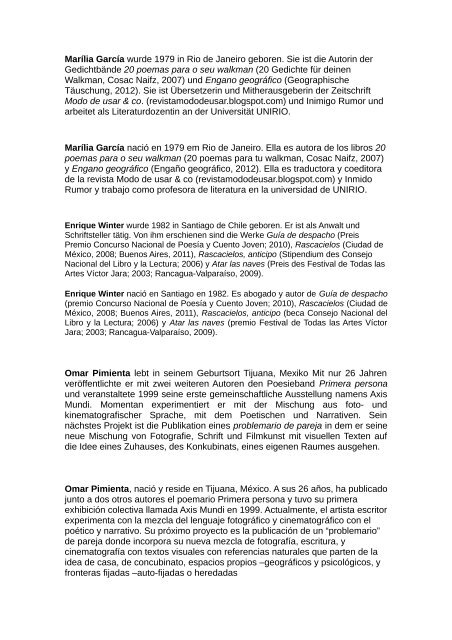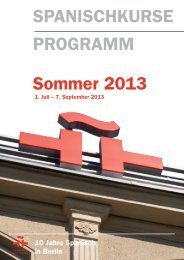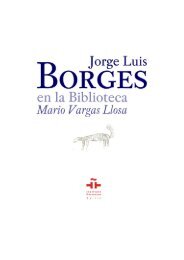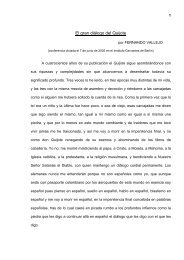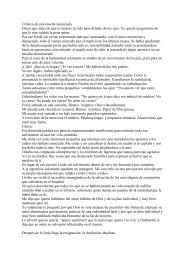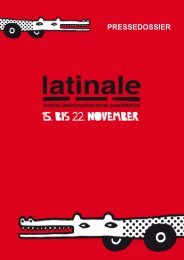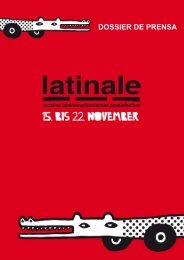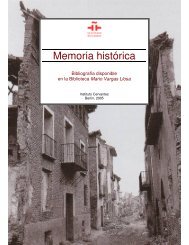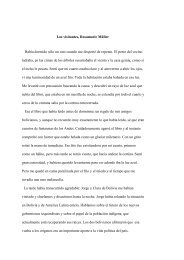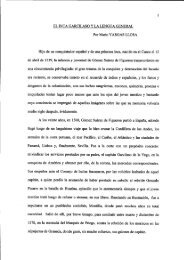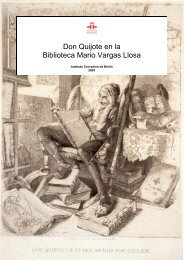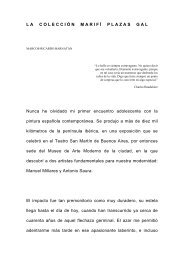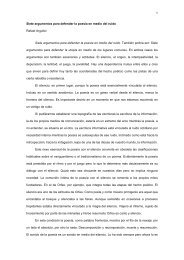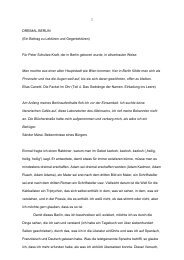Más información sobre los autores/as - Instituto Cervantes Berlin
Más información sobre los autores/as - Instituto Cervantes Berlin
Más información sobre los autores/as - Instituto Cervantes Berlin
You also want an ePaper? Increase the reach of your titles
YUMPU automatically turns print PDFs into web optimized ePapers that Google loves.
Marília García wurde 1979 in Rio de Janeiro geboren. Sie ist die Autorin der<br />
Gedichtbände 20 poem<strong>as</strong> para o seu walkman (20 Gedichte für deinen<br />
Walkman, Cosac Naifz, 2007) und Engano geográfico (Geographische<br />
Täuschung, 2012). Sie ist Übersetzerin und Mitherausgeberin der Zeitschrift<br />
Modo de usar & co. (revistamododeusar.blogspot.com) und Inimigo Rumor und<br />
arbeitet als Literaturdozentin an der Universität UNIRIO.<br />
Marília García nació en 1979 em Rio de Janeiro. Ella es autora de <strong>los</strong> libros 20<br />
poem<strong>as</strong> para o seu walkman (20 poem<strong>as</strong> para tu walkman, Cosac Naifz, 2007)<br />
y Engano geográfico (Engaño geográfico, 2012). Ella es traductora y coeditora<br />
de la revista Modo de usar & co (revistamododeusar.blogspot.com) y Inmido<br />
Rumor y trabajo como profesora de literatura en la universidad de UNIRIO.<br />
Enrique Winter wurde 1982 in Santiago de Chile geboren. Er ist als Anwalt und<br />
Schriftsteller tätig. Von ihm erschienen sind die Werke Guía de despacho (Preis<br />
Premio Concurso Nacional de Poesía y Cuento Joven; 2010), R<strong>as</strong>cacie<strong>los</strong> (Ciudad de<br />
México, 2008; Buenos Aires, 2011), R<strong>as</strong>cacie<strong>los</strong>, anticipo (Stipendium des Consejo<br />
Nacional del Libro y la Lectura; 2006) y Atar l<strong>as</strong> naves (Preis des Festival de Tod<strong>as</strong> l<strong>as</strong><br />
Artes Víctor Jara; 2003; Rancagua-Valparaíso, 2009).<br />
Enrique Winter nació en Santiago en 1982. Es abogado y autor de Guía de despacho<br />
(premio Concurso Nacional de Poesía y Cuento Joven; 2010), R<strong>as</strong>cacie<strong>los</strong> (Ciudad de<br />
México, 2008; Buenos Aires, 2011), R<strong>as</strong>cacie<strong>los</strong>, anticipo (beca Consejo Nacional del<br />
Libro y la Lectura; 2006) y Atar l<strong>as</strong> naves (premio Festival de Tod<strong>as</strong> l<strong>as</strong> Artes Víctor<br />
Jara; 2003; Rancagua-Valparaíso, 2009).<br />
Omar Pimienta lebt in seinem Geburtsort Tijuana, Mexiko Mit nur 26 Jahren<br />
veröffentlichte er mit zwei weiteren Autoren den Poesieband Primera persona<br />
und veranstaltete 1999 seine erste gemeinschaftliche Ausstellung namens Axis<br />
Mundi. Momentan experimentiert er mit der Mischung aus foto- und<br />
kinematografischer Sprache, mit dem Poetischen und Narrativen. Sein<br />
nächstes Projekt ist die Publikation eines problemario de pareja in dem er seine<br />
neue Mischung von Fotografie, Schrift und Filmkunst mit visuellen Texten auf<br />
die Idee eines Zuhauses, des Konkubinats, eines eigenen Raumes ausgehen.<br />
Omar Pimienta, nació y reside en Tijuana, México. A sus 26 años, ha publicado<br />
junto a dos otros <strong>autores</strong> el poemario Primera persona y tuvo su primera<br />
exhibición colectiva llamada Axis Mundi en 1999. Actualmente, el artista escritor<br />
experimenta con la mezcla del lenguaje fotográfico y cinematográfico con el<br />
poético y narrativo. Su próximo proyecto es la publicación de un “problemario”<br />
de pareja donde incorpora su nueva mezcla de fotografía, escritura, y<br />
cinematografía con textos visuales con referenci<strong>as</strong> naturales que parten de la<br />
idea de c<strong>as</strong>a, de concubinato, espacios propios –geográficos y psicológicos, y<br />
fronter<strong>as</strong> fijad<strong>as</strong> –auto-fijad<strong>as</strong> o heredad<strong>as</strong>
Leiseylento ist ein Projekt der beiden ausgebildeten bildenden KünstlerInnen<br />
und Autodidakten Katja von Helldorf aka Otok und Cristián Forte aka Beatriz del<br />
Río, welches seit 2007 zwischen <strong>Berlin</strong> und Buenos Aires operiert. Leiseylento<br />
steht unter dem starken Einfluss der surrealistische Bewegung, der Queer<br />
Theory und des DIY-Spirit. D<strong>as</strong> Debüt-Album «Repair» beschreibt d<strong>as</strong> Konzept<br />
der Dekonstruktion/Rekonstruktion: Die Aktion des Reparierens als Arbeit an<br />
etw<strong>as</strong>, d<strong>as</strong> nutz<strong>los</strong> geworden ist – doch d<strong>as</strong> Besondere ist d<strong>as</strong> Potenzial, etw<strong>as</strong><br />
zu verbessern oder zu transformieren.<br />
Leiseylento es un proyecto de <strong>los</strong> artist<strong>as</strong> Katja von Helldorf y Cristián Forte<br />
que opera entre l<strong>as</strong> ciudades de <strong>Berlin</strong> y Buenos Aires. Ambos son artist<strong>as</strong> con<br />
formación y/o experiencia en el campo de l<strong>as</strong> artes visuales y performance. En<br />
el ámbito musical son totalmente autodidact<strong>as</strong>. Leiseylento se encuentra muy<br />
influenciado por el Movimiento Surrealista, l<strong>as</strong> teorí<strong>as</strong> Queer y el espíritu DIY.<br />
Su album debut Repair se interesa, entre algun<strong>as</strong> temátic<strong>as</strong>, en describir <strong>los</strong><br />
conceptos de deconstrucción y reconstrucción, integración y desintegración. La<br />
acción de reparar todo aquello se ha vuelto inútil pero que, sin embargo, aún<br />
conserva el potencial de superarse y transformarse.<br />
Cristian Forte, geboren 1977 in Buenos Aires, wohnt seit 2009 in <strong>Berlin</strong>. Er<br />
studierte Soziologie an der Universität von Buenos Aires. Seine Interessen und<br />
Kreativarbeit konzentrieren sich hauptsächlich auf Poesie. Er ist Gründer und<br />
Mitwirkender in der politischen und künstlerischen Gruppe Etcétera, einem<br />
interdisziplinären Kollektiv beeinflusst vom Surrealismus und der Bewegung<br />
Internacional Errorista. Forte ist Mitherausgeber des Magazins Archibaldo und<br />
veröffentlichte d<strong>as</strong> Buch Abr. mit experimenteller Poesie. 2010 gründete er d<strong>as</strong><br />
Verlags Milena <strong>Berlin</strong> und war Teil der Organitation des Portable Book Fair<br />
<strong>Berlin</strong>. Zur Zeit arbeitet er in drei Performanceprojekte die bildende Kunst,<br />
Poesie und Musik verbinden: Leiseylento, Piss Göttin und Alvernhe-Forte<br />
HUMO.<br />
Cristian Forte, nacido en 1977 en Buenos Aires, vive desde el 2009 en Berlín.<br />
Estudió Sociología en la universidad de Buenos Aires. Su trabajo creativo está<br />
especialmente centrado y dirigido al ámbito de la poesía. Formó parte del grupo<br />
de arte y política Etcétera, un colectivo interdisciplinario, influenciado por el<br />
surrealismo y fundó el movimiento Internacional Errorista en 2007. Forte es<br />
coeditor de la revista Archibaldo y publicó su primer libro de poesía<br />
experimental Abr. en 2010. Además, en 2010 fundó el proyecto editorial Milena<br />
Berlín y formó parte de la organización de la Portable Book Fair <strong>Berlin</strong>.<br />
Actualmente participa de varios proyectos que entrecruzan l<strong>as</strong> artes visuales, la<br />
poesía y la música: Leiseylento, Piss Göttin y Alvernhe-Forte HUMO.<br />
Marina Mari<strong>as</strong>ch wurde 1973 in Buenos Aires geboren. Sie studierte Philologie<br />
und Kultursoziologie. Sie hat die Gedichtbände coming attactions (1997), XXX<br />
(2001), tigre y león (2005) in dem von ihr gegründeten Verlag Siesta
veröffentlicht. 2009 gab der Verlag Vox ihr Werk, El zig zag de l<strong>as</strong> instituciones<br />
heraus, welches vom Fondo Metropolitano de l<strong>as</strong> Artes ausgezeichnet wurde.<br />
2011 erschien ihr erster Roman El matrimonio (Bajo la luna). Momentan bereitet<br />
sie eine Veröffentlichung im Verlag Mansalva vor. Sie berät große Verlage,<br />
schreibt Literaturkritiken und gibt Literaturworkshops.<br />
Marina Mari<strong>as</strong>ch nació en Buenos Aires en 1973. Estudió Letr<strong>as</strong> (UBA) y<br />
Sociología de la Cultura (UNSAM). Publicó Coming attractions (1997), XXX<br />
(2001), Tigre y león (2005), todos de poesía, bajo el sello editorial Siesta que<br />
fundó y codirige. En 2009 la editorial Vox publicó El zig zag de l<strong>as</strong> instituciones,<br />
reconocido por el Fondo Metropolitano de l<strong>as</strong> Artes. En 2011 publicó su primera<br />
novela, El matrimonio (Bajo la luna). Actualmente prepara la edición de un libro<br />
por editorial Mansalva. Trabaja como <strong>as</strong>esora para grandes editoriales, escribe<br />
crítica cultural, y dicta talleres literarios.<br />
Elsye Suquilanda Jaramillo, 1979 in Quito geboren, begann bereits in jungen<br />
Jahren zu schreiben. Sie studierte Filmwissenschaften am Columbia College,<br />
Chicago, und Produktion am Cuest TV Institut in Quito. 2008 lässt sie sich in<br />
<strong>Berlin</strong> wieder, wo sie zur Zeit arbeitet. Sie macht Perfomances, die Musik, Video<br />
und Poesie vermischen. Sie publizierte Nalg<strong>as</strong> (Gesäßbacken, Abya Yala,<br />
2003) und bereitet eine Veröffentlichung von Berlín pata de perro, Cortina de<br />
circo popular und Como se llama este libro vor.<br />
Elsye Suquilanda Jaramillo,nacido en 1979 en Quito, escribe desde muy<br />
joven. Ha estudiado cinematografía en el Columbia College, Chicago, tanto<br />
como producción en el <strong>Instituto</strong> Cuest TV de Quito, Ecuador. En 2008 se radica<br />
en Berlín, donde actualmente trabaja, haciendo performances que combinan<br />
música, vídeo y poesía. Ha publicado „Nalg<strong>as</strong>“ (Abya Yala, 2003) y está<br />
preparando la publicación de „Berlín pata de perro“, „Cortina de circo popular“ y<br />
„Como se llama este libro“.<br />
Daniel Bencomo, wurde 1980 in San Luís Potosí, Mexiko, geboren. Seine<br />
Gedichte, Rezensionen und Übersetzungen erscheinen in Magazinen wie<br />
Crítica, Luvina, Metrópolis y Periódico de poesía der UNAM. Er übersetzte<br />
Gedichte verschiedener junger Autoren aus dem Deutschen. Sein neuestes<br />
Werk Lugar de Residencia (Wohnort, Tierra Adentro, 2010) erhielt den Premio<br />
Nacional de Poesía Joven Elí<strong>as</strong> Nandino 2010. 2010-2011 war er Stipendiat de<br />
FONCA (Fondo Nacional para la Cultura y l<strong>as</strong> Artes, Nationaler Fond für Kultur<br />
und Kunst) im Bereich Junge Dichter<br />
Daniel Bencomo nació en 1980 en San Luis Potosí, México. Sus poem<strong>as</strong>,<br />
reseñ<strong>as</strong> y traducciones aparecen en revist<strong>as</strong> como Crítica, Luvina, Metrópolis y<br />
Periódico de poesía de la UNAM. Ha traducido del alemán poem<strong>as</strong> de diversos<br />
<strong>autores</strong> jóvenes. Su libro más reciente es „Lugar de Residencia“ (Tierra
Adentro, 2010) que obtuvo el Premio Nacional de Poesía Joven Elí<strong>as</strong> Nandino<br />
2010. Fue becario del FONCA (Fondo Nacional para la Cultura y l<strong>as</strong> Artes) en<br />
el área de Jóvenes Creadores-Poesía durante el período 2010-2011.<br />
Nicole Cecilia Delgado, 1980 in Puerto Rico geboren, studierte Vergleichende<br />
Literaturwissenschaft an der Universität von Puerto Rico und Lateinamerika-<br />
und Karibikstudien an der SUNY Albany, New York sowie Filmregie an der<br />
Escuela Internacional de Cine y Televisión in San Antonio de <strong>los</strong> Baños<br />
(Havanna, Kuba) und Literarische Kreation an der Sociedad General de<br />
Escritores de México (SOGEM). Sie veranstaltet Kurse für Poesie, Literatur,<br />
Journalismus und Buchbinderei. Zwischen 2008 und 2009 nahm sie am<br />
internationalen Schriftstellerkollektiv L<strong>as</strong> Poet<strong>as</strong> del Megáfono in Mexiko-Stadt<br />
teil. Sie arbeitete auch mit dem Genre der Videopoesie und schreibt seit 2005<br />
den Blog Rabietario. Sie veröffentlichte 13 Poesiebände und in<br />
Zusammenarbeit mit Tom Slingsbz die Anthologie zeitgenössischer<br />
lateinamerikanischer Dichtung Hallucinated Horse /New Latin American Poets.<br />
Nicole Cecilia Delgado, nacido en 1980 en Puerto Rico, estudió Literatura<br />
Comparada en la Universidad de Puerto Rico y Estudios de América Latina y el<br />
Caribe en SUNY Albany, New York aparte de estudios de guión cinematográfico<br />
en la Escuela Internacional de Cine y Televisión de San Antonio de <strong>los</strong> Baños<br />
(Habana, Cuba) y Creación Literaria en la Sociedad General de Escritores de<br />
México (SOGEM). Organiza talleres de creación literaria, poesía, periodismo,<br />
encuadernación y libro. Entre <strong>los</strong> años 2008-2009, participó del colectivo<br />
internacional de escritor<strong>as</strong> L<strong>as</strong> Poet<strong>as</strong> del Megáfono en la Ciudad de México.<br />
También ha trabajado el género de la videopoesía y mantiene desde el 2005 el<br />
blog Rabietario. Publicó 13 libros de poesía y la antología de traducciones de<br />
poesía contemporánea latinoamericana Hallucinated Horse /New Latin<br />
American Poets, en colaboración con Tom Slingsby.


